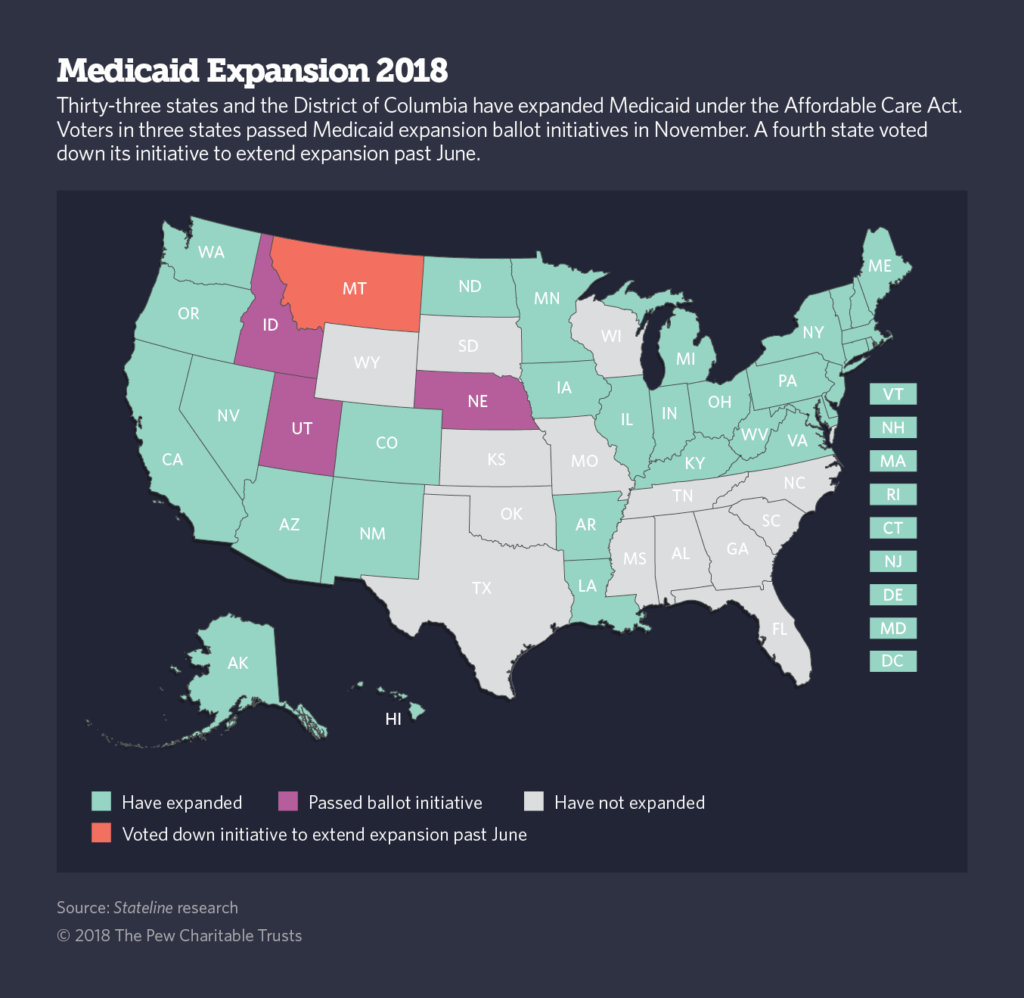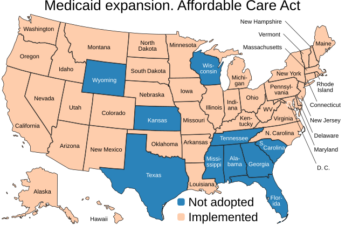
By Christine Vestal, Stateline
Utah voters approved a ballot measure in November to expand Medicaid in that state after years of contentious protests over the issue, including this one in 2017. Expansion would extend health care benefits to some 150,000 residents in Utah.
The three red states — Idaho, Nebraska and Utah — that bucked their own Republican legislatures last month and approved Medicaid expansion under the Affordable Care Act are likely to proceed, despite Friday’s ruling by a federal judge in Texas that the entire federal health care law is unconstitutional.
Even in Montana, where voters last month defeated an extension of the temporary Medicaid expansion approved in 2015, legislative leaders predict that lawmakers will make the expansion permanent, since it is politically unpopular to take coverage away from people once it has been extended.
Voter-approved Medicaid expansion would extend health care benefits to 91,000 low-income people in Idaho, nearly 90,000 in Nebraska and 150,000 in Utah.
“It’s in statute, so there’s no turning back on it,” Nebraska state Sen. Adam Morfeld, a Democrat who has championed the plan, said in an interview Monday. “The only way we turn back on this is because it’s repealed at the federal level.” He said he’s confident that won’t happen.
“If we didn’t enact policy in our state because of pending court cases elsewhere, we’d never enact policy,” Morfeld said. “There are lawsuits on just about every federal program.”
Similarly, Utah’s voter-approved Medicaid expansion is on track for swift implementation, according to Matt Slonaker, executive director of the Utah Health Policy Project, which supports the initiative. The state’s Medicaid director is days away from submitting a so-called state plan amendment implementing the expansion. And the federal government is expected to approve it well in advance of its April effective date.
“We see no reason to think the court decision will slow down the process in any way,” Slonaker said. “This is a district court way down in Texas that is trying to be disruptive with very weak legal reasoning. Here in Utah, we’re all systems go.”
In Idaho, a Medicaid expansion referendum passed with over 60 percent of the vote, and had the support of the Republican governor, Butch Otter. In Nebraska and Utah, Republican governors opposed the expansion. (In Montana, Democratic Gov. Steve Bullock supported the ballot measure that would have extended the state’s temporary Medicaid expansion rather than rolling back coverage.)
With the three states added to the list, 36 states plus Washington, D.C., have now approved Medicaid expansion, likely adding pressure on the remaining states to do so.
Late Friday, U.S. District Judge Reed O’Connor overturned the entire ACA, ruling that when congressional Republicans eliminated the penalty for Americans who do not carry health insurance as part of their broader tax overhaul, they invalidated the health law. I
n his 55-page opinion, O’Connor pointed out that the U.S. Supreme Court in 2012 upheld the ACA based on the idea that Congress has the power “to impose a tax on those without health insurance.”
Without the penalty, O’Connor argued, there is no tax, and therefore the law is unconstitutional. Legal analysts from both sides of the political spectrum have cast doubt on that logic, predicting the decision will be appealed. In the meantime, the ACA stays in place.
“We remain optimistic that Americans have made it clear that they want to expand access to care, not shrink it,” said Colin Diersing, a spokesman for the Fairness Project, which helped bankroll the four state ballot initiatives.
Montana voters defeated the Medicaid expansion ballot question this fall, but polls showed many were turned off by the idea of funding it with a tobacco tax; the tobacco industry spent mightily in opposition.
Nevertheless, Montana’s Republican-controlled legislature will be taking up expansion bills in January, and every bill is expected to get a chance at a hearing and a vote.
“The legislature is very divided on this issue,” said Montana Senate President Scott Sales, a Republican. Although he’s trying to learn more about what Friday’s court ruling might mean, he said, Democrats and the moderate wing of his party together likely have the votes to pass an expansion, though conservatives will work to impose cost-control measures.
Len Nichols of George Mason University’s Center for Health Policy Research and Ethics cautioned that Friday’s ruling gives “ammunition” to expansion opponents who have raised concerns about the cost of expansion and whether the federal government will fulfill its pledge to cover 90 percent of the expense.
“At a minimum, it sows confusion, which may have been part of the goal,” said Nichols, who served as a health care adviser to President Bill Clinton. “It does cast doubt on whether the law will survive.
“Between the hard core opponents of the Affordable Care Act, the president’s own ability to stir up opposition to it, and the fact that a number of people in the states are still opposed, it gives ammunition to those who want to delay.”
In non-expansion states such as Kansas, where the Democratic governor-elect wants Medicaid expansion but the Republican majority legislature opposes it, the ruling could thwart or postpone any legislative plans to extend the low-income health care plan.
In Washington, Nina Owcharenko Schaefer, senior health policy research fellow at the conservative Heritage Foundation, said in an interview that the Texas decision highlights for states — particularly the ballot initiative states — “that things are still uncertain and they should proceed with caution as they look at the financial viability of this moving forward.”
Wayne Hoffman, president of the conservative Idaho Freedom Foundation think tank, counseled legislators to move cautiously in crafting the details of an expansion plan. Should the U.S. Supreme Court eventually strike down “Obamacare” and its federal match for states’ Medicaid expansion, he warned, “the costs would increase substantially.”
“State legislators and the governor certainly need to be mindful of the fact there is a pretty big moving target when it comes to costs,” Hoffman said in an interview Monday. His group also has a lawsuit pending in the Idaho Supreme Court that would declare November’s ballot initiative unconstitutional. Arguments in that case are scheduled for Jan. 29.
“We’re suggesting that legislators do nothing,” Hoffman said, “that they bide their time and that we wait at least for a state Supreme Court to make the ruling before we get into actual implementation of anything.”
He figures lawmakers in other states are paying attention too. Should states have to fund Medicaid expansion entirely on their own, he said, exponential cost increases would eat into state needs such as public safety and education.
“I think most legislatures are in session in 2019, and so this is going to have to be something top of mind, and whatever you implement is going to potentially be implemented forever,” Hoffman said. “The price is going to be going up and up. … It’s going to be one of the larger [decisions] that legislators would make.”
Montana state Rep. Greg Hertz, a Republican and the incoming House speaker, agreed that states will have to adjust their Medicaid expansions should the U.S. Supreme Court eventually strike down the Affordable Care Act.
“If the federal government changes the match, the 90-10 match, Montana and most states can’t afford it,” Hertz said in an interview. “If that happens, then Medicaid expansion will no longer exist, at least, I believe, in Montana.”


